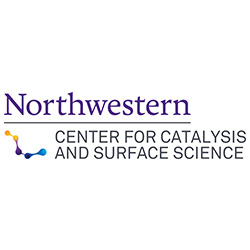Center for Catalysis Ipatieff ACS Prize Winner Seminar - Phillip Christopher

When:
Friday, May 10, 2024
1:00 PM - 2:00 PM CT
Where: Technological Institute, LR 5, 2145 Sheridan Road, Evanston, IL 60208 map it
Audience: Faculty/Staff - Post Docs/Docs - Graduate Students
Contact:
Kimberly Leroi
(847) 467-3396
Group: Center for Catalysis and Surface Science (CCSS)
Category: Lectures & Meetings
Description:
Center for Catalysis and Surface Science (CCSS) Monthly Meeting
Lecture at 1:00pm on Friday, May 10, 2024
*Please note that the event reception will proceed the lecture and begin at 11:45am in the J-wing atrium (registration required).
Speaker: Phillip Christopher, UC Santa Barbara, 2022 ACS Ipatieff Prize Recipient
About the Ipatieff Prize
In 1943, the ACS Board of Directors accepted responsibility for administering an award created by a trust agreement between Vladimir N. and Barbara Ipatieff and Northwestern University, establishing the Ipatieff Trust Fund. Northwestern University is the trustee of the fund. The award seeks to recognize outstanding chemical experimental work in the field of catalysis or high pressure, carried out by an individual of any nationality who is not over 40 years of age.
Lecture abstract:
"Designing Bimetallic Catalysts at the Scale of Single Atoms: Reactivity, Selectivity, and Stability"
Many industrial chemical transformations are mediated by solid-state catalysts containing late-transitional metal nanostructures that serve as active sites. Efforts to optimize catalyst performance metrics (activity, selectivity, and stability) have led to the identification of bimetallic nanostructures that exhibit performance beyond what can be achieved by the constituent metals alone. Crucial for these optimization efforts is control of the physical and chemical interactions within bimetallic nanostructures. However, structure-function relationships often remain elusive in bimetallic catalysts at the active site scale due to the complex configurational space of structure structures that exists in this class of catalysts.
Here, I will highlight 2 recent examples from my group where atomistic scale-structure function relationships have been developed for oxide supported bimetallic catalysts. In the first example, we demonstrate that Rh-W single atom pairs on Al2O3 exhibit a bifunctional reaction mechanism for alkene hydroformylation that allows 1000X activity enhancement and 50% selectivity enhancement as compared to Rh single atom catalysts. In the second example, it will be shown that the addition of < 1:100 mol fraction of Pt or Rh to supported Cu nanoparticles results in drastic stability enhancement under methanol synthesis reaction conditions through the mitigation of metal nanoparticle sintering. Through both examples we will highlight how multi-modal high surface area catalyst characterization can be correlated to model system studies using theory and surface science to develop structure-function relationships that explain the enhanced performance of bimetallic catalysts.
About the speaker:
Phillip Christopher earned his B.S. in chemical engineering from University of California, Santa Barbara in 2006 and his M.S and Ph.D. in chemical engineering from University of Michigan in 2011 working with Prof. Suljo Linic. From 2011-2017 he was an Assistant Professor at University of California, Riverside. In 2017 he moved to the University of California, Santa Barbara where he is a Professor and Vice Chair for Undergraduate Affairs in the Chemical Engineering Department and the Mellichamp Chair in Sustainable Manufacturing. He serves as a Senior Editor for ACS Energy Letters. His research interests are in sustainable chemical conversion, heterogeneous catalysis by supported metals, dynamic behavior of catalysts, and photocatalysis by metal nanostructures. He has been given various awards including the Presidential Early Career Award for Scientists and Engineers (PECASE), AIChE CRE Division Young Investigator Award, and Ipatieff Prize from the ACS.
The Center for Catalysis and Surface Science (CCSS) monthly meetings host speakers, as well as provide tutorials, research updates and facilitate team collaboration.
The mission of the Center for Catalysis and Surface Science (CCSS) is to promote interdisciplinary research fundamental to the discovery, synthesis, and understanding of catalysts and catalytic reactions essential to modern society. As a part of the Paula M. Trienens Institute for Sustainability and Energy, CCSS applies fundamental advances in catalysis science towards applications in alternative fuels, abatement of harmful emissions, resource recovery concepts, new processing routes, and many other strategies towards making chemicals more sustainable.